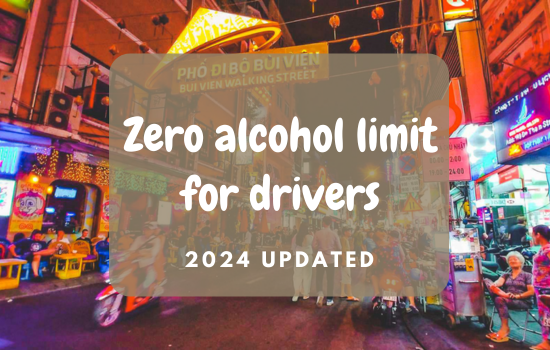


Vietnam has a long history of struggling with drunk driving. According to the National Traffic Safety Committee, alcohol was a contributing factor in nearly a third of all traffic accidents in 2022. This translates to a staggering number of casualties and injuries, highlighting the need for stricter measures.
Proponents of the zero-tolerance law argue that even a small amount of alcohol can impair driving ability. Reaction times slow, judgment becomes clouded, and coordination diminishes, all of which increase the risk of accidents.
Under the previous legislation, Vietnam had a tiered system of penalties for driving under the influence (DUI). Drivers with a BAC below a certain limit faced fines and license suspension, while those exceeding the limit were subject to harsher punishments. However, the new law eliminates these tiers, establishing a complete ban on driving with any detectable level of alcohol in your system.
This zero-tolerance approach extends to all drivers, including those operating motorbikes, cars, trucks, and other motorized vehicles. There are no exceptions, and violators face significant penalties.
The consequences of driving under the influence in Vietnam can be severe. Here's a breakdown of the penalties drivers can expect under the new law:
Challenges and Considerations
While the zero-tolerance policy has been met with widespread support from safety advocates, there are some concerns. Critics point out that the strict enforcement might pose difficulties for social customs in Vietnam, where socializing often involves alcohol consumption.
Another concern is the potential impact on livelihoods, particularly for motorbike taxi drivers who rely on their vehicles for income. The law requires them to remain completely sober throughout their workday, which could be challenging depending on their work schedules.
Moving Forward with Safer Roads
Despite the challenges, the zero-tolerance law represents a significant step forward for road safety in Vietnam. By eliminating any ambiguity regarding alcohol consumption and driving, the law aims to create a clearer message and deter potential offenders.
The success of this policy will depend on effective enforcement and public awareness campaigns. Educating the public about the dangers of drunk driving and the consequences of violating the law is crucial for changing behavior and achieving long-term results.
Additional Considerations for Travelers
If you're planning to visit Vietnam and intend to drive or rent a motorbike, it's essential to be aware of the new zero-alcohol tolerance law. Here are some key takeaways for travelers:
By following these guidelines and prioritizing safety, you can ensure a smooth and enjoyable travel experience in Vietnam.
Conclusion
The implementation of the zero-tolerance law signifies Vietnam's commitment to improving road safety and protecting its citizens. While challenges remain, the potential benefits of this legislation are undeniable. With a continued focus on education, enforcement, and alternative transportation options, Vietnam can pave the way for a future with fewer alcohol-related accidents and a safer driving environment for all.
Copyright © 2024.Company name All rights reserved.